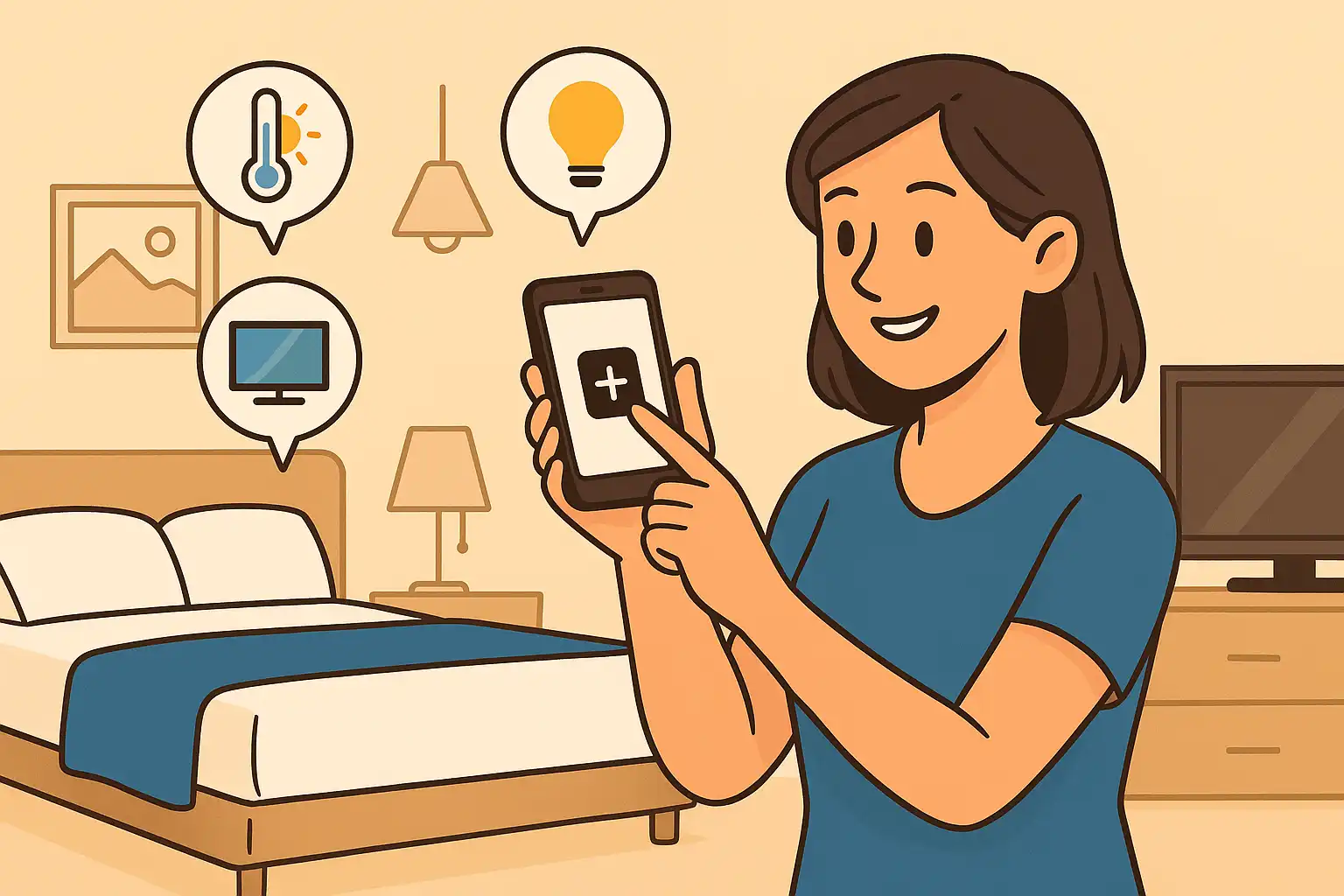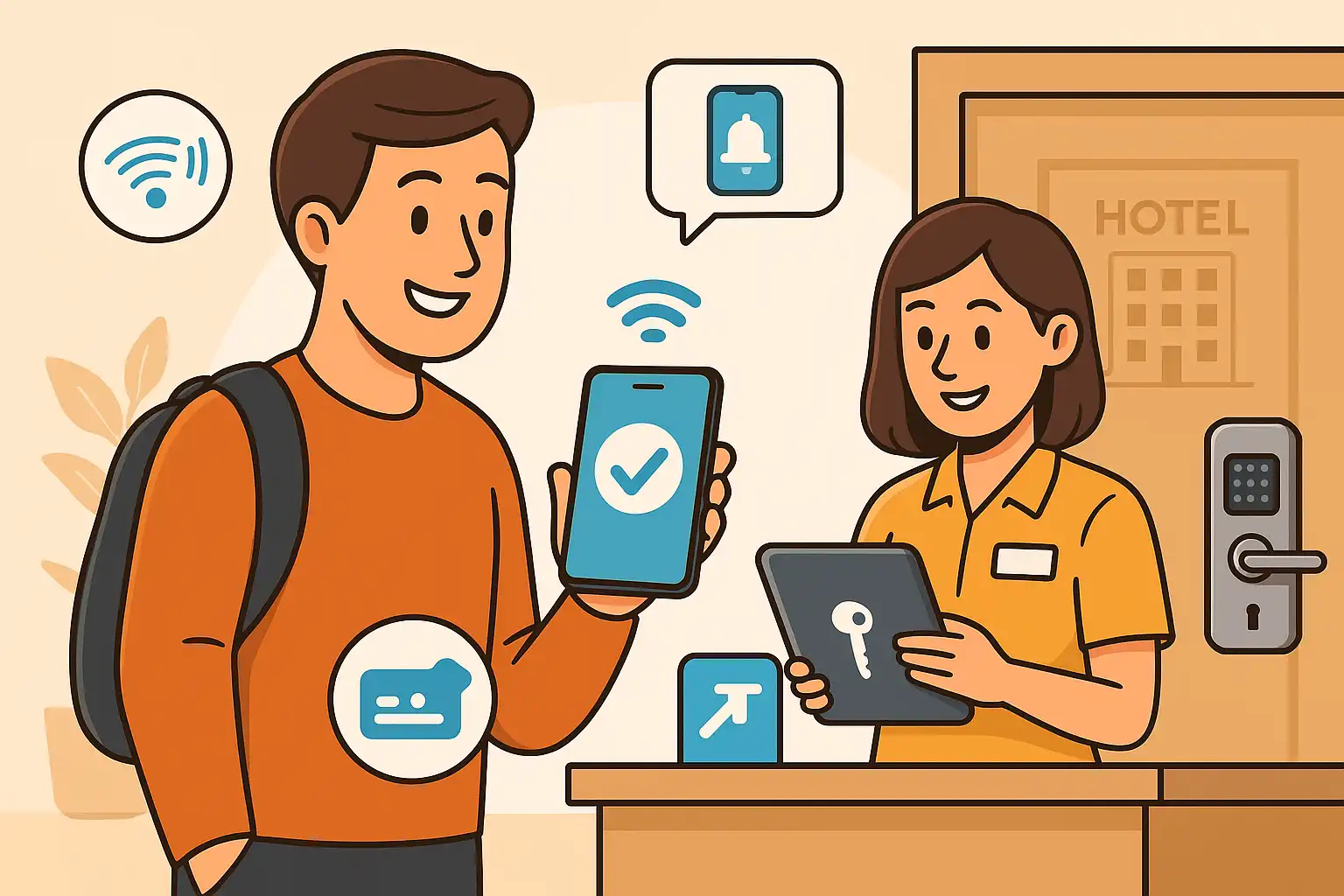Contactless Technology in Hotels: Transforming Guest Experience
 Mika Takahashi
Mika Takahashi Mika Takahashi
Mika TakahashiThe hospitality world has changed fast, and contactless technology is now a key part of what guests expect. Recent data shows 80% of travelers prefer hotels with contactless app features, and 71% of business travelers want online check-in options. This isn’t just a passing trend—it’s how guests want to interact with hotels today.
Contactless technology covers a range of digital tools that remove physical touchpoints throughout a guest’s stay. From mobile check-in to digital keys and contactless payments, these tools are reshaping how hotels operate while improving guest satisfaction and efficiency.
For hotel operators, adopting contactless solutions goes beyond meeting expectations. It’s about gaining a lasting edge in a digital market. Hotels using these technologies often see more revenue per guest, lower operating costs, and stronger guest loyalty.

Contactless technology means using digital tools to let guests interact with your hotel without physical contact or face-to-face interaction. It relies on near field communication (NFC), radio frequency identification (RFID), QR codes, and mobile apps to make the guest experience smooth and efficient.
The goal is to remove friction points—no more waiting in line for a key card or fumbling with cash payments. Instead, guests use their phones or other devices to handle everything from check-in to payments.
Key tools include mobile apps linked to property management systems, NFC payment terminals, RFID door locks, and cloud-based communication platforms. Together, they create a seamless digital system that balances guest convenience with smooth hotel operations.
These contactless systems integrate smoothly with your existing hotel management software and guest platforms. That means guest preferences, loyalty info, and daily operations stay in sync across all channels. The tech backbone is often API-first, letting you connect multiple services without disrupting workflows. This real-time data flow keeps everything coordinated—from mobile apps to payment systems and back-office tools.
Mobile check-in is one of the biggest wins for hotels today. With 71% of business travelers favoring online contactless check-in, properties that offer it see guest satisfaction jump by about 25%.
Web-based check-in means guests don’t have to download an app—they just use their browser. They can choose room preferences, request upgrades, or submit special requests before arrival.
Digital ID checks speed things up by about a third compared to front desk lines. The system verifies IDs, processes payments, and assigns rooms automatically, cutting wait times and freeing staff.
Mobile check-out works the same way—guests review charges, leave feedback, and get digital receipts without visiting the front desk. Hotels using these systems often see shorter queues and more productive staff.
Pro tip: Train your front desk team to assist guests who might be less tech-savvy during mobile check-in to ensure a smooth transition for everyone.
Digital keys delivered through your hotel’s app are replacing plastic key cards. They work with your existing door locks and give guests quick, secure access on their phones.
This cuts down front desk visits and lets guests get to their rooms immediately. Some systems even work with wearables like smartwatches or wristbands, handy for guests who don’t want to pull out their phone.
Digital keys link directly to your property management system, so credentials are ready as soon as the room is assigned. You can remotely revoke access if a device is lost, boosting security.
In practice, hotels report fewer front desk bottlenecks and better guest feedback after switching to digital keys.
Contactless payments are no longer optional—they’re expected. NFC terminals accept Apple Pay, Google Pay, contactless credit cards, and debit cards, speeding up transactions everywhere from the front desk to hotel restaurants.
Tokenization replaces sensitive card data with unique codes, keeping payments secure and meeting PCI DSS compliance. QR code payments add flexibility, letting guests scan menus and pay without touching physical items—a hit for poolside service or spa bookings.
Invisible payments take this further by charging pre-approved cards automatically for things like minibar or spa treatments, making the experience frictionless.
Digital concierge chatbots handle guest questions and service requests 24/7 without tying up staff. They can answer common queries about amenities, local attractions, or bookings, and escalate complex issues to your team.
Mobile hotel messaging lets guests text the front desk or housekeeping directly, replacing phone calls with a quick, convenient channel. Guests can order room service, report maintenance, or request cleaning on their schedule.
Automated FAQs speed up responses to common questions, freeing staff to focus on personalizing guest experiences.
Real-time service requests feed directly into your operations system, so staff get clear, trackable tasks and can prioritize efficiently.

Contactless tech opens new doors for revenue. Digital check-in can prompt guests to upgrade rooms or buy packages right when they’re most engaged. Mobile ordering ups average spend by making it easy to browse menus and add extras.
Personalized offers based on guest data help boost ancillary sales with targeted promotions. And happier guests mean more repeat business and better reviews.
For example, a mid-size hotel saw a 15% increase in spa bookings after adding mobile ordering and personalized upselling during check-in.
Hotels using contactless systems report 30% fewer guest complaints, thanks to clearer communication and quicker service. Digital tools cut issue resolution times in half compared to phone calls.
Automating routine front desk tasks frees staff to focus on personal service. Housekeeping benefits too, with instant room status updates helping schedule cleanings faster.
Contactless services reduce physical touchpoints, meeting guest expectations for hygiene without sacrificing service quality.
Faster digital ordering and communication improve guest satisfaction scores. Secure payment processing builds trust and cuts billing disputes.
Together, these factors create a contactless guest experience that encourages positive reviews, repeat bookings, and referrals.
Choose API-first platforms that plug into your existing property management system smoothly. Cloud-based solutions offer the flexibility to adapt as guest needs change.
PCI DSS compliance is a must for payment security. Work with certified vendors who understand hospitality’s unique demands.
Your system should support a range of payment methods—NFC cards, mobile wallets, and emerging tech—to keep guests happy and future-proof your setup.
Train your team to balance technology with personal service. Guests need clear instructions before arrival and support during their stay.
Keep traditional options available for guests who prefer face-to-face interaction or aren’t comfortable with digital tools.
Use guest feedback to refine your contactless offerings continuously.
Though upfront costs can be significant, many hotels see ROI within 12 to 18 months through labor savings, efficiency gains, and increased guest spend.
Tracking guest satisfaction scores, repeat bookings, and ancillary revenue helps measure success.
Secure payments reduce chargebacks and disputes, protecting your revenue.
Staff freed from routine tasks can focus on creating memorable experiences that keep guests coming back.
Biometric authentication with facial or fingerprint recognition is gaining ground, offering secure, card-free access.
Voice controls let guests adjust room settings or request services with simple voice commands, integrating with popular smart assistants.
IoT tech personalizes rooms by adjusting lighting, temperature, and entertainment based on guest preferences and occupancy.
Blockchain could enhance guest identity verification and loyalty programs, adding security and transparency.
Digital receipts and paperless processes cut waste and support sustainability goals.
Energy-efficient contactless systems optimize usage based on occupancy, lowering costs and environmental impact.
Eco-conscious travelers appreciate hotels that demonstrate commitment to green practices, making sustainability a competitive advantage.
Look for vendors who understand hospitality’s unique needs and provide strong integration support.
Scalability matters, especially if you manage multiple properties or plan to grow.
Ongoing support and updates keep your systems secure and up to date with new payment methods and guest expectations.
Myth vs Reality: Many think contactless tech replaces human service. In reality, it frees your team to focus on personalized guest interactions that technology can’t deliver.
Contactless technology is no longer optional—it’s essential. Hotels that act now improve guest satisfaction, streamline operations, and boost revenue. The future belongs to those who embrace this shift thoughtfully and strategically.
Ready to transform your hotel’s guest experience and operations? Start exploring contactless solutions today and stay ahead in the evolving hospitality landscape.